Let you understand the reasons and solutions for MySQL startup failure
This article brings you relevant knowledge about mysql, which mainly introduces related issues about mysql startup failure, including the reasons for startup failure and solutions, etc., which may be due to lack of My.ini file, lack of data files, port occupation and other issues, let's take a look at them together. I hope it will be helpful to everyone.

Recommended learning: mysql video tutorial
My computer here is win10 and mysql is version 8.0.
Generally, when installing MySQL through a compressed installation package, MySQL may fail to start, as shown below: 
Based on various information on the Internet and your own actual operations, summarize For the following three reasons:
1. Lack of my.ini file
Create the my.ini file through Notepad. You can also search for other my.ini files on your computer. After copying it, modify it (make sure it is in the format of the configuration file).
After creating the my.ini file, save it to the sever directory, as shown below:
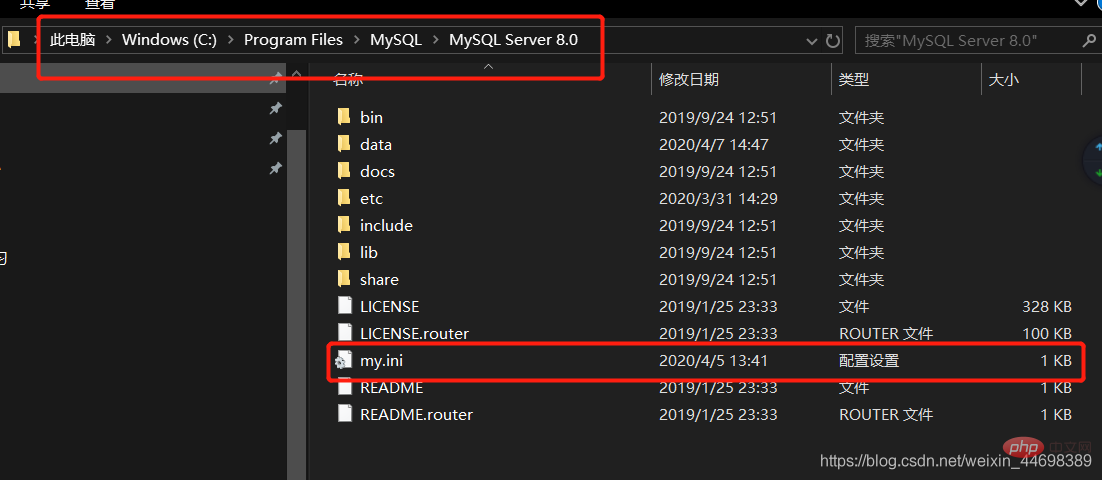
2. Lack of data file
When there is a lack of data files, be careful not to create data files manually! ! ! Manually creating the data file will still fail to start.
Operation method:
(1) Run the command control character (cmd) as administrator
Attention! ! ! If you do not run as an administrator at this time, errors may occur.
(2) Enter
mysqld --initialize --user=mysql --console
in cmd and 
will appear. Remember the temporary password at this time, you will use it later.
Notice! ! !
If the command line is mysqld --initialize-insecure without adding –console, when logging in to mysql, just click enter to enter. The password at this time is an empty password, but a password will be generated later, which we cannot see. Yes, I won’t be able to log in to mysql next time. (Wrong password)
(3) Run mysql

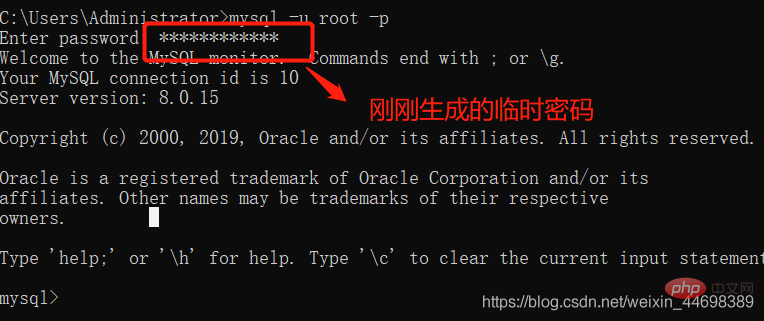
(4) Change the password and enter ALTER USER 'root'@' localhost' IDENTIFIED WITH mysql_native_password BY 'new password';
ALTER USER 'root'@'localhost' IDENTIFIED WITH mysql_native_password BY '123456';
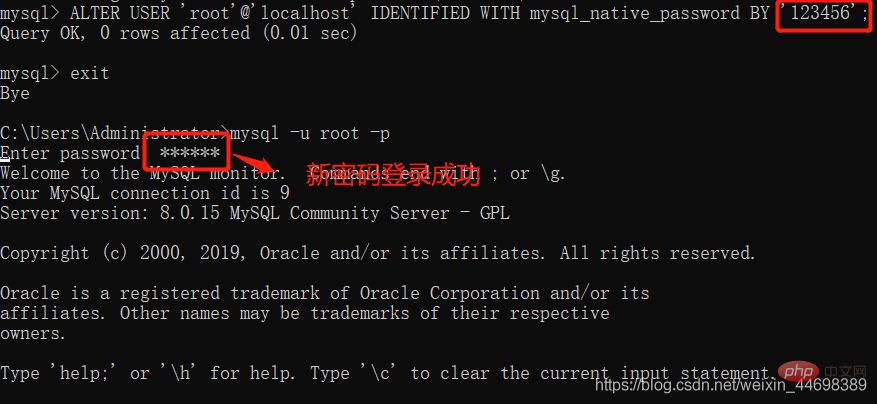
3. Port occupation (MySQL's default port is 3306)
You can view it here .err file under data to check whether there is any port occupation.
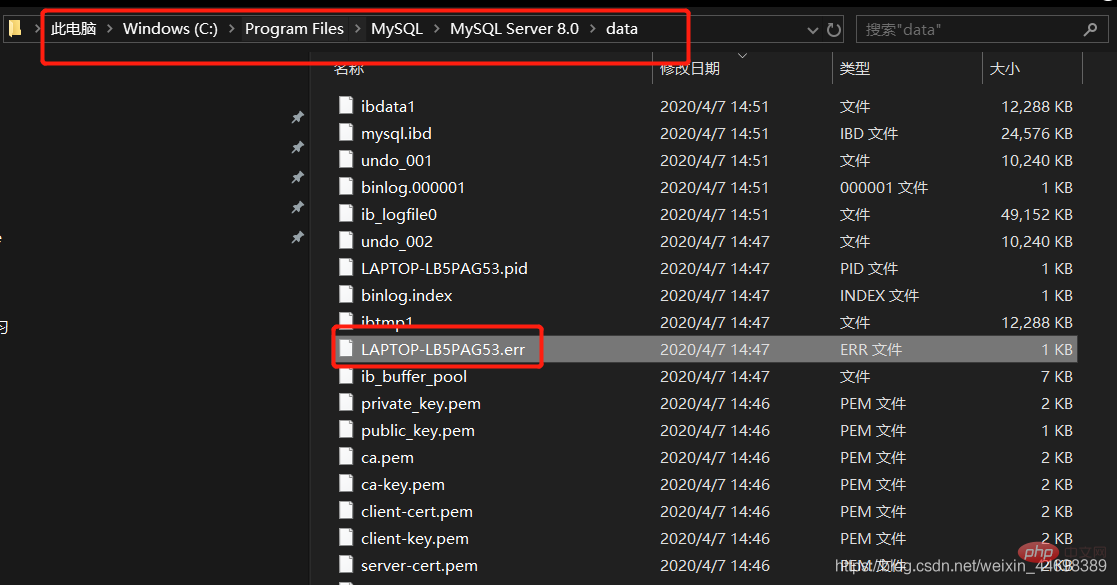
If the port is occupied, you can check which process occupies port 3306 by entering the following command on the command line.
netstat -ano

Find the PID occupying port 3306, as shown below: 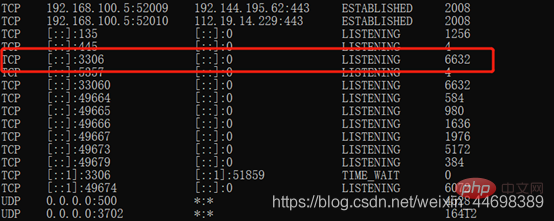
Go to Task Manager to close the process corresponding to the corresponding PID. 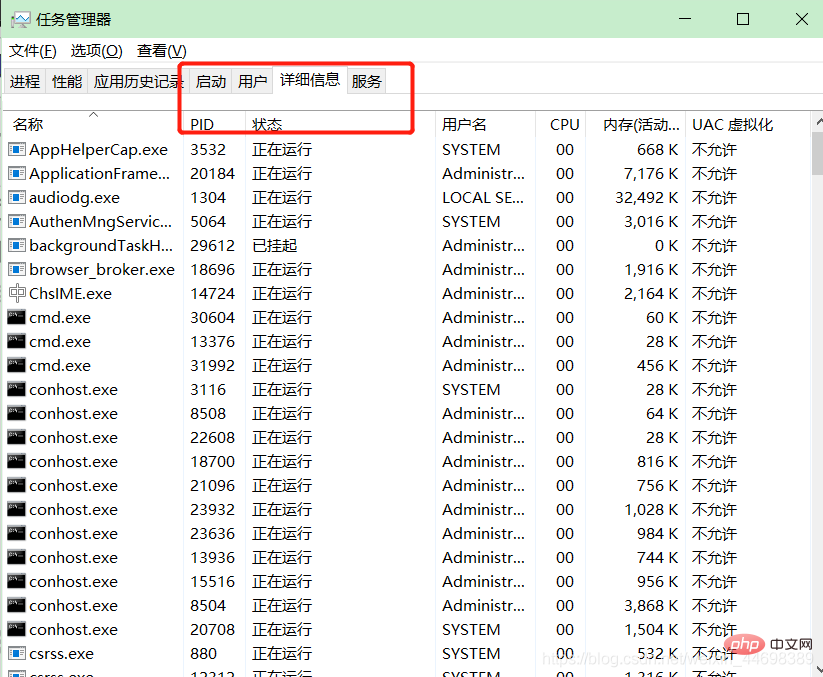
The problem is successfully solved at this time! ! !
During the process of running mysql, other errors may also occur. The corresponding reasons can be obtained by checking the .err file in the data.
Recommended learning: mysql video tutorial
The above is the detailed content of Let you understand the reasons and solutions for MySQL startup failure. For more information, please follow other related articles on the PHP Chinese website!

Hot AI Tools

Undresser.AI Undress
AI-powered app for creating realistic nude photos

AI Clothes Remover
Online AI tool for removing clothes from photos.

Undress AI Tool
Undress images for free

Clothoff.io
AI clothes remover

AI Hentai Generator
Generate AI Hentai for free.

Hot Article

Hot Tools

Notepad++7.3.1
Easy-to-use and free code editor

SublimeText3 Chinese version
Chinese version, very easy to use

Zend Studio 13.0.1
Powerful PHP integrated development environment

Dreamweaver CS6
Visual web development tools

SublimeText3 Mac version
God-level code editing software (SublimeText3)

Hot Topics
 1376
1376
 52
52
 The relationship between mysql user and database
Apr 08, 2025 pm 07:15 PM
The relationship between mysql user and database
Apr 08, 2025 pm 07:15 PM
In MySQL database, the relationship between the user and the database is defined by permissions and tables. The user has a username and password to access the database. Permissions are granted through the GRANT command, while the table is created by the CREATE TABLE command. To establish a relationship between a user and a database, you need to create a database, create a user, and then grant permissions.
 MySQL: The Ease of Data Management for Beginners
Apr 09, 2025 am 12:07 AM
MySQL: The Ease of Data Management for Beginners
Apr 09, 2025 am 12:07 AM
MySQL is suitable for beginners because it is simple to install, powerful and easy to manage data. 1. Simple installation and configuration, suitable for a variety of operating systems. 2. Support basic operations such as creating databases and tables, inserting, querying, updating and deleting data. 3. Provide advanced functions such as JOIN operations and subqueries. 4. Performance can be improved through indexing, query optimization and table partitioning. 5. Support backup, recovery and security measures to ensure data security and consistency.
 Can I retrieve the database password in Navicat?
Apr 08, 2025 pm 09:51 PM
Can I retrieve the database password in Navicat?
Apr 08, 2025 pm 09:51 PM
Navicat itself does not store the database password, and can only retrieve the encrypted password. Solution: 1. Check the password manager; 2. Check Navicat's "Remember Password" function; 3. Reset the database password; 4. Contact the database administrator.
 Query optimization in MySQL is essential for improving database performance, especially when dealing with large data sets
Apr 08, 2025 pm 07:12 PM
Query optimization in MySQL is essential for improving database performance, especially when dealing with large data sets
Apr 08, 2025 pm 07:12 PM
1. Use the correct index to speed up data retrieval by reducing the amount of data scanned select*frommployeeswherelast_name='smith'; if you look up a column of a table multiple times, create an index for that column. If you or your app needs data from multiple columns according to the criteria, create a composite index 2. Avoid select * only those required columns, if you select all unwanted columns, this will only consume more server memory and cause the server to slow down at high load or frequency times For example, your table contains columns such as created_at and updated_at and timestamps, and then avoid selecting * because they do not require inefficient query se
 How to create navicat premium
Apr 09, 2025 am 07:09 AM
How to create navicat premium
Apr 09, 2025 am 07:09 AM
Create a database using Navicat Premium: Connect to the database server and enter the connection parameters. Right-click on the server and select Create Database. Enter the name of the new database and the specified character set and collation. Connect to the new database and create the table in the Object Browser. Right-click on the table and select Insert Data to insert the data.
 How to copy tables in mysql
Apr 08, 2025 pm 07:24 PM
How to copy tables in mysql
Apr 08, 2025 pm 07:24 PM
Copying a table in MySQL requires creating new tables, inserting data, setting foreign keys, copying indexes, triggers, stored procedures, and functions. The specific steps include: creating a new table with the same structure. Insert data from the original table into a new table. Set the same foreign key constraint (if the original table has one). Create the same index. Create the same trigger (if the original table has one). Create the same stored procedure or function (if the original table is used).
 How to view database password in Navicat for MariaDB?
Apr 08, 2025 pm 09:18 PM
How to view database password in Navicat for MariaDB?
Apr 08, 2025 pm 09:18 PM
Navicat for MariaDB cannot view the database password directly because the password is stored in encrypted form. To ensure the database security, there are three ways to reset your password: reset your password through Navicat and set a complex password. View the configuration file (not recommended, high risk). Use system command line tools (not recommended, you need to be proficient in command line tools).
 How to view mysql
Apr 08, 2025 pm 07:21 PM
How to view mysql
Apr 08, 2025 pm 07:21 PM
View the MySQL database with the following command: Connect to the server: mysql -u Username -p Password Run SHOW DATABASES; Command to get all existing databases Select database: USE database name; View table: SHOW TABLES; View table structure: DESCRIBE table name; View data: SELECT * FROM table name;




